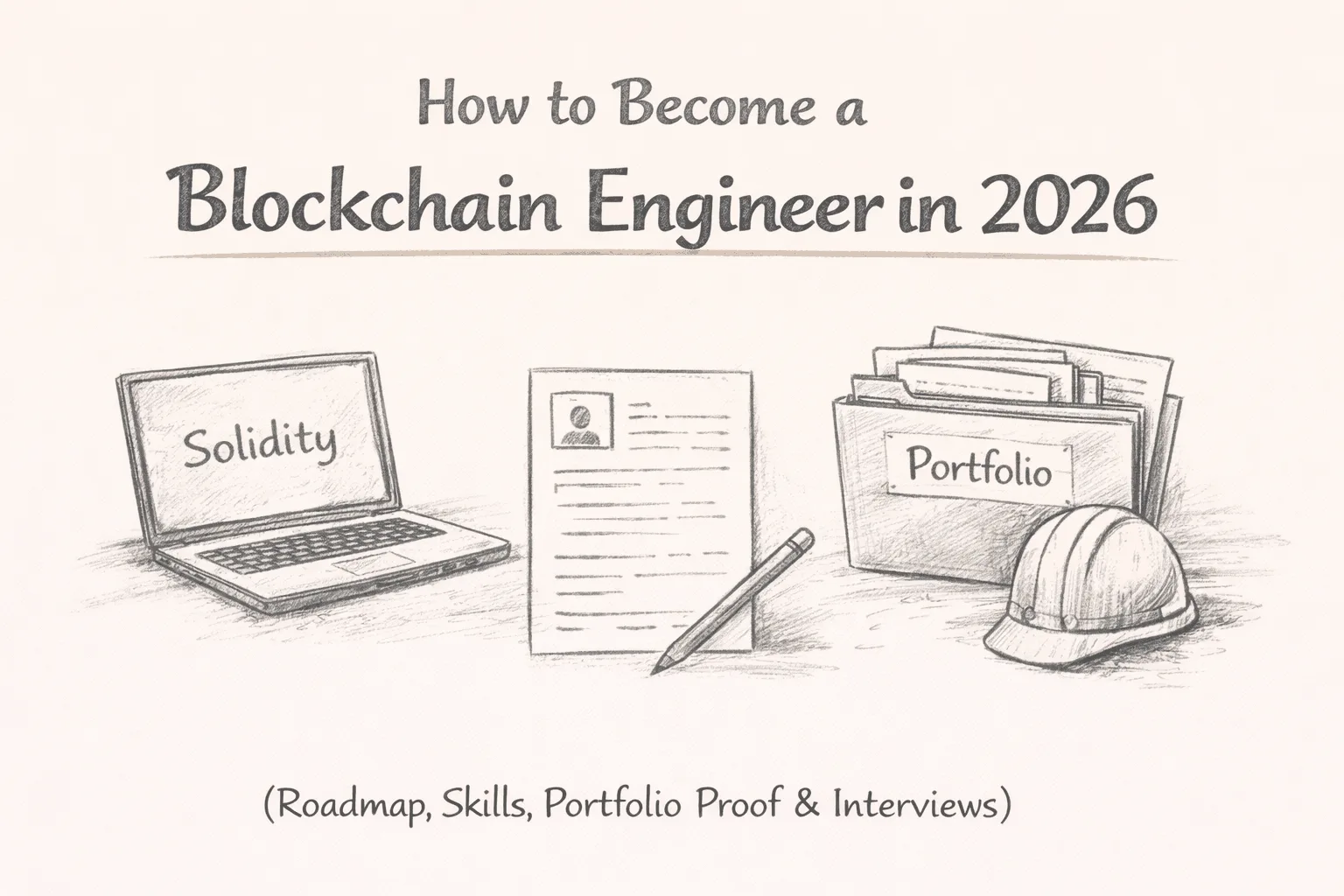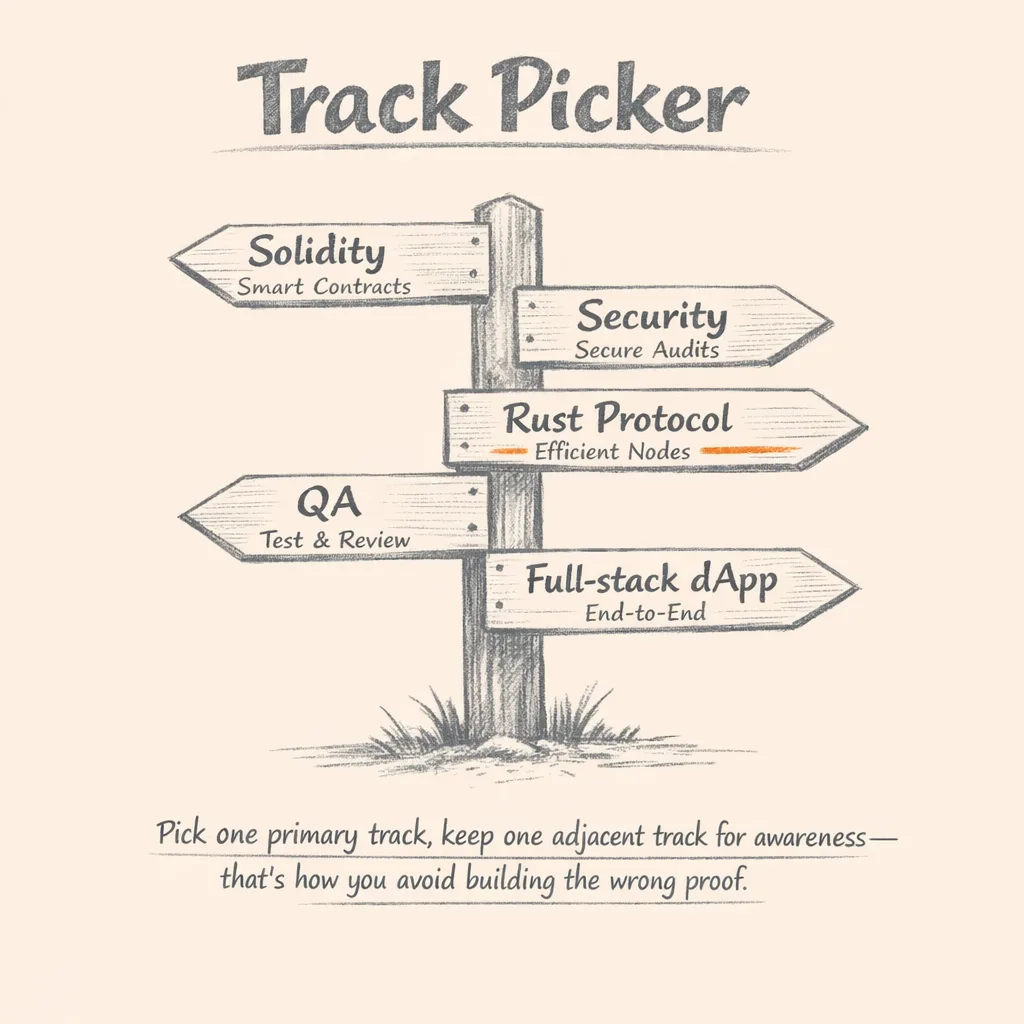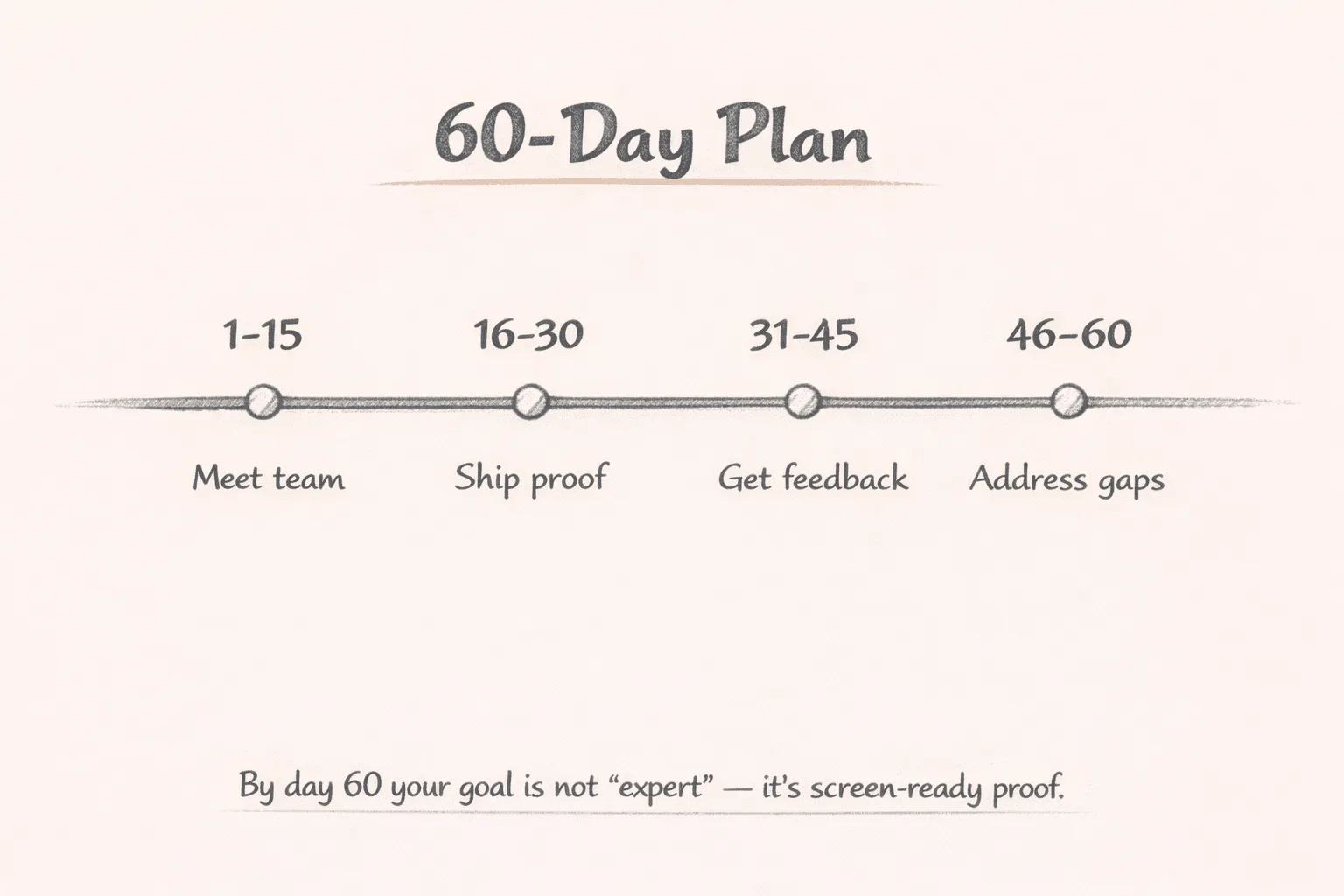How to Become a Blockchain Engineer in 2025 (Skills, Salaries, Interviews & Career Map)

Updated for 2026: tooling expectations (Hardhat/Foundry), proof pack formats, and interview screening signals.
What does a blockchain engineer actually do (and what gets you hired)?
If you’re searching how to become a blockchain engineer, the hardest part isn’t learning Solidity or Rust. The hardest part is building proof that hiring teams can verify quickly. If you searched how to become a blockchain developer, this guide covers the same technical path — with clearer tracks and proof expectations.
Most candidates don’t fail because they didn’t work hard. They fail because they prepared for the wrong track and built the wrong artifacts. Tutorials don’t get shortlisted. Recruiters can shortlist a clean repo, tests, a readable README, and a short write-up that shows how you think. Interviews reward debugging discipline, testing maturity, and how you explain risk and trade-offs.
Example of real proof: one GitHub repo with tests + a README that states assumptions and edge cases + a one-page write-up describing what broke, how you fixed it, and what you’d improve next.
This guide is a technical career map. It will help you pick the right track (Solidity dev, protocol Rust, security/auditing, QA, full-stack dApp) and build a proof stack recruiters can click and evaluate.
TL;DR
Blockchain engineer = proof-first role. Recruiters shortlist what they can verify: a repo, tests, a clear README, and a short write-up explaining trade-offs and failures.
Pick one primary track for 60 days: Solidity smart contracts (fastest hiring lane) or Rust protocol engineering (deep systems lane). Keep one adjacent track for awareness (security, QA, or full-stack).
Tool choice is secondary to depth. Learn one workflow deeply (Hardhat or Foundry) and be able to read the other. Interviews grade testing + debugging more than tool brand.
Build a “proof pack,” not a tutorial trail. 1 small project + tests + README (assumptions/edge cases) + 1-page write-up is enough to start getting real feedback.
Remote is real, but filtered. “Remote” still depends on proof strength, overlap hours, and country eligibility — treat vague job posts as “remote on paper.”
Before you go further: who this guide is for
You’ll get value from this guide if you are:
a Web2 developer switching into Solidity or Rust roles
a fresher building your first on-chain proof
a junior Solidity dev not converting interviews
a QA/test engineer moving into blockchain QA + smart contract testing
a builder who shipped something but can’t explain decisions under interview pressure
This guide is not blockchain basics. It’s a jobs + proof + interview guide for technical tracks.

What “blockchain engineer” means in real hiring
A blockchain engineer builds and tests decentralized systems where security and correctness are part of the job, not afterthoughts.
In practice, blockchain engineering means you can build, test, and reason about systems where:
State is shared and persistent
Failures are expensive and hard to roll back
Security is part of correctness
“it works on my machine” is meaningless without reproducibility
Most “blockchain engineer” roles map to one of these technical tracks:
Smart contract engineer (Solidity / EVM)
Protocol engineer (Rust / Go / systems)
Security / auditing track (adjacent, highly valued)
Blockchain QA / test engineering (adjacent, real hiring track)
Full-stack dApp engineer (Web2 + wallet + chain integration)
If you’re new, don’t try to learn all tracks at once. Pick one primary track and keep one adjacent track as awareness.
Hardhat vs Foundry: what interviewers expect in Solidity roles
Ignore tool hype — what matters is what your workflow signals in interviews.
Hardhat is common in teams that value flexible scripting, integrations, and mature JS tooling.
Foundry is common in teams that care deeply about fast testing, debugging, and developer ergonomics in Solidity.
If you’re preparing for Solidity interviews, the expectation is usually:
You can write unit tests that cover edge cases
You can debug a failing test and explain the root cause
You can reason about common failure modes (access control, reentrancy, price oracles, rounding, approvals)
You can explain trade-offs (security vs UX vs gas vs upgradeability)
Decision rule: pick the tool your target roles mention most. If you can’t tell, start with Foundry for faster testing and debugging feedback loops — and be comfortable reading Hardhat repos.
What recruiters actually evaluate (even when they don’t say it)
Job descriptions list skills. Interviews grade signals.
The first screen often looks for:
Can I click something real? (GitHub repo, tests, demo, write-up)
Can this person explain decisions? (README quality, commit intent, architecture notes)
Do they understand risk? (security awareness, edge cases, threat thinking)
Do they test like an engineer or like a tutorial follower? (tests, negative cases, reproducibility)
If you want a deeper explanation of proof-first hiring patterns: Proof-Based Hiring in Web3 (how founders evaluate GitHub + tests) — https://artofblockchain.club/article/proof-based-hiring-in-web3-2025-how-founders-evaluate-github-tests-smart-contracts
Technical tracks and how they differ in hiring
1) Smart Contract Engineer (Solidity / EVM)
This role writes and ships on-chain logic: DeFi flows, NFT logic, access control, upgrade paths, integrations, and operational safety. In real hiring, “I deployed ERC-20” doesn’t impress. What matters is how you handle correctness under adversarial conditions.
Shortlist signals
a repo with tests (Hardhat/Foundry), not just contracts
clean README: what it does, assumptions, threat surface, how to run tests
ability to explain edge cases and failure handling
familiarity with OpenZeppelin patterns without copying blindly
What to build in 2 weeks: one small contract project + 6–10 tests (including negative cases) + a README that lists assumptions and edge cases.
2) Smart Contract Security / Auditor Track (adjacent)
Auditors review contracts to find vulnerabilities, logic errors, and exploit paths before attackers do. Even if you don’t want to become an auditor, security thinking makes you a stronger Solidity engineer.
Shortlist signals
a write-up of one real vulnerability (what it is, why it happens, how to fix)
ability to reason about exploit paths, not just name vulnerabilities
comfort reading unfamiliar code and forming hypotheses
What to build in 2 weeks: pick one common vulnerability, recreate a minimal example, write the fix, and add a test that proves the fix.
3) Protocol Engineer (Rust track)
Protocol engineers work on the foundations: consensus, networking, execution, mempool dynamics, performance, and correctness under distributed systems constraints. This is deep systems work, and it is not the same skill set as writing Solidity.
Shortlist signals
evidence of systems thinking (trade-offs, profiling, correctness arguments)
contributions to open-source repos or a clear systems project write-up
ability to explain how nodes communicate and why failures happen
What to build in 2 weeks: a small Rust project or technical note that explains a protocol concept (state machine, transaction processing, networking flow) plus a short “trade-offs and failure modes” section.
4) Full-stack dApp Engineer
This role bridges Web2 + Web3: wallets, signatures, chain reads/writes, transaction states, UX under failure, and frontend performance. It’s a real hiring track, but many candidates get rejected because they can’t handle wallet/network failure states cleanly.
Shortlist signals
a working dApp with real transaction state handling (pending/failed/replaced/confirmed)
good UX under failure (network mismatch, rejected signature, RPC errors)
clean separation of concerns (UI vs chain adapters)
What to build in 2 weeks: a tiny dApp that handles the full transaction lifecycle cleanly and shows clear states and errors.
5) Blockchain QA / Test Engineer
Blockchain QA is not clicking buttons. It’s about reproducibility, transaction flow validation, wallet behavior, chain state assumptions, and how failures manifest across environments.
Shortlist signals
a test strategy that includes negative cases (revert reasons, event assertions)
automation evidence (even small) plus a failure-case report
clarity on what “pass” means in an asynchronous system
What to build in 2 weeks: a test plan for a wallet → sign → send → confirm flow, plus one documented failure-case report with reproducible steps.
A typical Solidity interview loop (what each round tests)
Most Solidity interview loops follow a predictable pattern, even when the job title differs.
Screening: repo + tests + README clarity + ability to explain your decisions
Live debugging: a failing test or revert scenario, and how you isolate the root cause
Design + trade-offs: upgradeability, access control, threat surface, and operational safety
Take-home or mini-review: read unfamiliar code, identify risks, propose fixes, and justify priorities
If you prepare for the loop, not just the language, your hit rate improves fast.
How to choose your first path (without wasting months)
Pick based on the kind of problems you enjoy solving:
logic + testing + edge cases → Solidity smart contracts
systems + performance + distributed reasoning → protocol Rust
breaking and defending systems → security/auditing adjacent
reproducibility + failure analysis → blockchain QA
product UI + integration realism → full-stack dApp
Pick one primary track and build proof for 30–60 days. Switching tracks is easier after you’ve shipped something real.
A practical 60-day roadmap (technical tracks)
This is not a syllabus. It’s a structure to prevent drifting. The goal by day 60 is screen-ready proof.

Days 1–15: build foundations you can explain
Focus on:
transactions, state, accounts, signatures
what smart contracts can and can’t do
how wallets + RPC + chain interactions behave
Days 16–30: pick one track and start building proof
Focus on:
one small build with constraints
tests or reproducibility from day one
documentation of assumptions and edge cases
Days 31–45: build one proof pack
Pick one:
Solidity proof pack (repo + tests + README + short write-up)
Security proof pack (vulnerability write-up + fix + test)
Rust proof pack (systems note + small artifact + trade-offs)
QA proof pack (test strategy + failure-case report + repro steps)
Days 46–60: publish, get feedback, iterate
Do:
publish repo + write-up
ask specific questions (“Which test cases are missing?” “What assumption is weakest?”)
iterate based on feedback
What counts as proof in Web3 hiring (and what doesn’t)
Recruiters don’t just read resumes. They click.
Counts as proof
a repo with meaningful commits and tests
a write-up explaining decisions and failures
reproducible steps (how to run tests, how to reproduce a bug)
evidence you can debug, not just build
small but consistent public output
Doesn’t count (by itself)
certificates with no artifacts
“I watched X hours”
copy-paste projects without explanation
screenshots without repos or reasoning
Interview reality: what gets you shortlisted for Solidity roles
Most Solidity interviews repeatedly probe:
testing maturity (unit + negative cases)
debugging discipline (why did this fail?)
security awareness (common exploit patterns and mitigations)
trade-offs (gas vs readability vs upgradeability vs safety)
ability to explain in plain language
A strong way to communicate is to narrate:
What you assumed
What can go wrong
What you tested
What you would monitor in production
Are Web3 jobs really remote? Yes — with constraints
Remote is real, but many postings are remote on paper. The hidden filters are:
overlap hours and communication expectations
legal/compliance constraints (country eligibility)
proof strength (screening is harsh)
Remote Job reality checklist
Is it truly async or does it require fixed overlap hours?
Contractor vs full-time is clear?
Country eligibility is clear?
Screening asks for repo/case study/test?
If 2–3 answers are unclear, treat it as remote on paper and move on.
FAQs
1) Do I need a CS degree to become a blockchain engineer?
Not necessarily. Many blockchain engineers come from non-CS backgrounds, but you do need CS thinking: debugging, basic data structures, and the ability to reason about trade-offs. Hiring teams usually care more about verifiable proof than degrees — a repo with tests, a clear README, and a short write-up that explains what broke and what you fixed. If you’re missing fundamentals, learn them while building a small proof pack so your progress stays visible.
2) How do I switch from Web2 to Web3 without wasting months?
Switch by choosing one technical track and building proof in public instead of collecting courses. A simple approach is: pick Solidity (or Rust), build one small project with tests, write a one-page explanation of assumptions and edge cases, and share it for feedback. Most “wasted months” happen when people learn widely but ship nothing. If you can produce one proof pack in 30–45 days, you’ll understand where interviews actually test you.
3) Which should I learn first: Solidity or Rust?
If your goal is smart contract roles and faster interview opportunities, start with Solidity and learn testing deeply (Hardhat or Foundry). If your goal is protocol/infra roles, commit to Rust and systems thinking — networking, execution flow, performance, and correctness under distributed constraints. If you’re unsure, choose the track that matches the jobs you’re applying to right now and run a 60-day proof experiment: one repo, one write-up, one feedback loop. Let outcomes decide.
4) What’s the fastest way to show proof to recruiters?
The fastest proof is something clickable and reproducible: a GitHub repo with tests, a README that states assumptions, and a short write-up describing trade-offs and failure handling. Recruiters don’t have time to infer your ability from vague claims, but they can quickly scan a repo structure, test coverage, and clarity of thinking. Aim for one meaningful artifact every month — consistency beats a “perfect” portfolio that never ships.
5) Hardhat or Foundry for interview prep?
Either tool can get you hired — the differentiator is how well you test and debug. Foundry is great for fast feedback loops in Solidity testing and debugging; Hardhat is common in teams that rely on JS tooling and integrations. Pick the tool your target roles mention most. If you can’t tell, start with Foundry for testing depth, and learn to read Hardhat projects. In interviews, what matters is your ability to explain edge cases, revert behavior, and trade-offs — not the tool brand.
Related AOB resources (optional deep dives)
Job Search & Career Navigation Hub
— https://artofblockchain.club/discussion/job-search-web3-career-navigation-hub
Smart Contract Developer Career Hub
— https://artofblockchain.club/discussion/smart-contract-developer-career-hub
Smart Contract Security Audits Hub
— https://artofblockchain.club/discussion/smart-contract-security-audits-hub
Projects That Can Help Me Land a Junior Blockchain Developer Job
Rust vs Solidity — Which Has Better Blockchain Job Opportunities?
When blockchain QA tests pass locally but fail on mainnet
Proof-Based Hiring in Web3 (how founders evaluate GitHub + tests)
Author
I’m Shubhada Pande, founder of ArtOfBlockchain.club — a discussion-first platform where Web3 hiring signals surface publicly through engineers, auditors, product leaders, and operators active in the ecosystem.
This article is shaped by recurring patterns seen across real blockchain career and hiring discussions — where candidates and hiring managers speak openly outside formal interviews.
